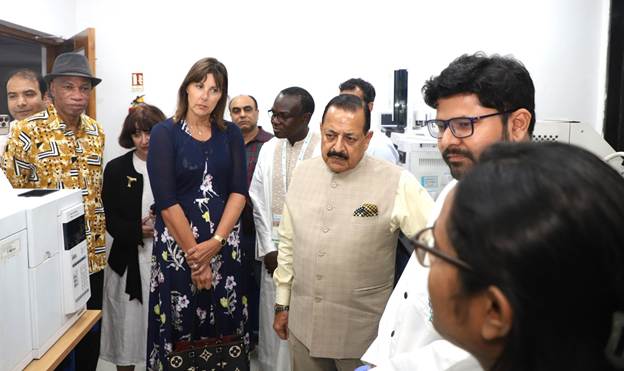India is set to conduct its first-ever biological experiments aboard the International Space Station (ISS) to explore the sustainability of human life in space, Union Minister of State for Science & Technology Jitendra Singh announced on Thursday.
The research is part of the BioE3 (Biotechnology for Economy, Environment & Employment) policy, launched under the leadership of Prime Minister Narendra Modi, and represents a collaborative effort between the Indian Space Research Organisation (ISRO) and the Department of Biotechnology (DBT).
The experiments will be conducted during the upcoming AXIOM-4 mission to the ISS, now scheduled to launch on June 8 from NASA’s Kennedy Space Center in Florida. Group Captain Shubhanshu Shukla will represent India as a crew member on this milestone mission.
The first experiment will examine the effects of microgravity and space radiation on the growth of edible microalgae—a nutrient-rich potential food source for long-duration space missions.
With high protein, lipid, and bioactive compound content, microalgae also offer exceptional photosynthetic efficiency, enabling effective carbon dioxide absorption and oxygen production in closed environments like spacecraft. Their short growth cycle and biomass productivity make them a promising candidate for sustainable food and air regeneration systems in space.
The second experiment will investigate the growth and proteomic responses of cyanobacteria—specifically Spirulina and Synechococcus—under microgravity, using both urea- and nitrate-based media.
Spirulina, known as a space “superfood,” is rich in proteins and vitamins and can potentially help recycle carbon and nitrogen from human waste, making it valuable for closed-loop life support systems in long-term missions or extraterrestrial habitats.
Both experiments are being developed in collaboration with scientists from the International Centre for Genetic Engineering and Biotechnology (ICGEB), New Delhi, under the broader ISRO-DBT research partnership.
Singh highlighted these developments during a visit to the newly inaugurated DBT-ICGEB Biofoundry, a state-of-the-art facility built on the Design-Build-Test-Learn (DBTL) model. The facility, which was virtually inaugurated during the 31st Meeting of the ICGEB Board of Governors, aims to accelerate synthetic biology and biomanufacturing research.
Singh praised PM Modi’s “visionary leadership” for propelling India’s biotechnology sector to global prominence and emphasized the strategic importance of the BioE3 Policy. Approved by the Union Cabinet in 2024, the policy seeks to drive innovation and growth across six strategic areas: bio-based chemicals and enzymes, smart proteins and functional foods, precision therapeutics, climate-resilient agriculture, carbon capture and utilization, and marine and space research.














